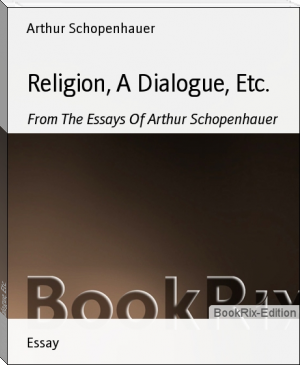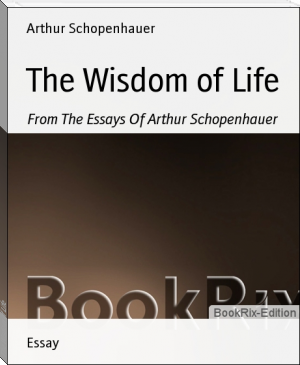Religion, A Dialogue, Etc. by Arthur Schopenhauer (red white and royal blue hardcover .txt) 📖

Download in Format:
- Author: Arthur Schopenhauer
Book online «Religion, A Dialogue, Etc. by Arthur Schopenhauer (red white and royal blue hardcover .txt) 📖». Author Arthur Schopenhauer
morality, its pessimism, and its Avatar, are all thoroughly Indian. It is its morality which places it in a position of such emphatic and essential antagonism to the Old Testament, so that the story of the Fall is the only possible point of connection between the two. For when the Indian doctrine was imported into the land of promise, two very different things had to be combined: on the one hand the consciousness of the corruption and misery of the world, its need of deliverance and salvation through an Avatar, together with a morality based on self-denial and repentance; on the other hand the Jewish doctrine of Monotheism, with its corollary that "all things are very good" [Greek: panta kala lian]. And the task succeeded as far as it could, as far, that is, as it was possible to combine two such heterogeneous and antagonistic creeds.
As ivy clings for the support and stay it wants to a rough-hewn post, everywhere conforming to its irregularities and showing their outline, but at the same time covering them with life and grace, and changing the former aspect into one that is pleasing to the eye; so the Christian faith, sprung from the wisdom of India, overspreads the old trunk of rude Judaism, a tree of alien growth; the original form must in part remain, but it suffers a complete change and becomes full of life and truth, so that it appears to be the same tree, but is really another.
Judaism had presented the Creator as separated from the world, which he produced out of nothing. Christianity identifies this Creator with the Saviour, and through him, with humanity: he stands as their representative; they are redeemed in him, just as they fell in Adam, and have lain ever since in the bonds of iniquity, corruption, suffering and death. Such is the view taken by Christianity in common with Buddhism; the world can no longer be looked at in the light of Jewish optimism, which found "all things very good": nay, in the Christian scheme, the devil is named as its Prince or Ruler ([Greek: ho archon tou kosmoutoutou.] John 12, 33). The world is no longer an end, but a means: and the realm of everlasting joy lies beyond it and the grave. Resignation in this world and direction of all our hopes to a better, form the spirit of Christianity. The way to this end is opened by the Atonement, that is the Redemption from this world and its ways. And in the moral system, instead of the law of vengeance, there is the command to love your enemy; instead of the promise of innumerable posterity, the assurance of eternal life; instead of visiting the sins of the fathers upon the children to the third and fourth generations, the Holy Spirit governs and overshadows all.
We see, then, that the doctrines of the Old Testament are rectified and their meaning changed by those of the New, so that, in the most important and essential matters, an agreement is brought about between them and the old religions of India. Everything which is true in Christianity may also be found in Brahmanism and Buddhism. But in Hinduism and Buddhism you will look in vain for any parallel to the Jewish doctrines of "a nothing quickened into life," or of "a world made in time," which cannot be humble enough in its thanks and praises to Jehovah for an ephemeral existence full of misery, anguish and need.
Whoever seriously thinks that superhuman beings have ever given our race information as to the aim of its existence and that of the world, is still in his childhood. There is no other revelation than the thoughts of the wise, even though these thoughts, liable to error as is the lot of everything human, are often clothed in strange allegories and myths under the name of religion. So far, then, it is a matter of indifference whether a man lives and dies in reliance on his own or another's thoughts; for it is never more than human thought, human opinion, which he trusts. Still, instead of trusting what their own minds tell them, men have as a rule a weakness for trusting others who pretend to supernatural sources of knowledge. And in view of the enormous intellectual inequality between man and man, it is easy to see that the thoughts of one mind might appear as in some sense a revelation to another.
Imprint
As ivy clings for the support and stay it wants to a rough-hewn post, everywhere conforming to its irregularities and showing their outline, but at the same time covering them with life and grace, and changing the former aspect into one that is pleasing to the eye; so the Christian faith, sprung from the wisdom of India, overspreads the old trunk of rude Judaism, a tree of alien growth; the original form must in part remain, but it suffers a complete change and becomes full of life and truth, so that it appears to be the same tree, but is really another.
Judaism had presented the Creator as separated from the world, which he produced out of nothing. Christianity identifies this Creator with the Saviour, and through him, with humanity: he stands as their representative; they are redeemed in him, just as they fell in Adam, and have lain ever since in the bonds of iniquity, corruption, suffering and death. Such is the view taken by Christianity in common with Buddhism; the world can no longer be looked at in the light of Jewish optimism, which found "all things very good": nay, in the Christian scheme, the devil is named as its Prince or Ruler ([Greek: ho archon tou kosmoutoutou.] John 12, 33). The world is no longer an end, but a means: and the realm of everlasting joy lies beyond it and the grave. Resignation in this world and direction of all our hopes to a better, form the spirit of Christianity. The way to this end is opened by the Atonement, that is the Redemption from this world and its ways. And in the moral system, instead of the law of vengeance, there is the command to love your enemy; instead of the promise of innumerable posterity, the assurance of eternal life; instead of visiting the sins of the fathers upon the children to the third and fourth generations, the Holy Spirit governs and overshadows all.
We see, then, that the doctrines of the Old Testament are rectified and their meaning changed by those of the New, so that, in the most important and essential matters, an agreement is brought about between them and the old religions of India. Everything which is true in Christianity may also be found in Brahmanism and Buddhism. But in Hinduism and Buddhism you will look in vain for any parallel to the Jewish doctrines of "a nothing quickened into life," or of "a world made in time," which cannot be humble enough in its thanks and praises to Jehovah for an ephemeral existence full of misery, anguish and need.
Whoever seriously thinks that superhuman beings have ever given our race information as to the aim of its existence and that of the world, is still in his childhood. There is no other revelation than the thoughts of the wise, even though these thoughts, liable to error as is the lot of everything human, are often clothed in strange allegories and myths under the name of religion. So far, then, it is a matter of indifference whether a man lives and dies in reliance on his own or another's thoughts; for it is never more than human thought, human opinion, which he trusts. Still, instead of trusting what their own minds tell them, men have as a rule a weakness for trusting others who pretend to supernatural sources of knowledge. And in view of the enormous intellectual inequality between man and man, it is easy to see that the thoughts of one mind might appear as in some sense a revelation to another.
Imprint
Publication Date: 05-21-2008
All Rights Reserved
Free ebook «Religion, A Dialogue, Etc. by Arthur Schopenhauer (red white and royal blue hardcover .txt) 📖» - read online now
Similar e-books:





Comments (0)